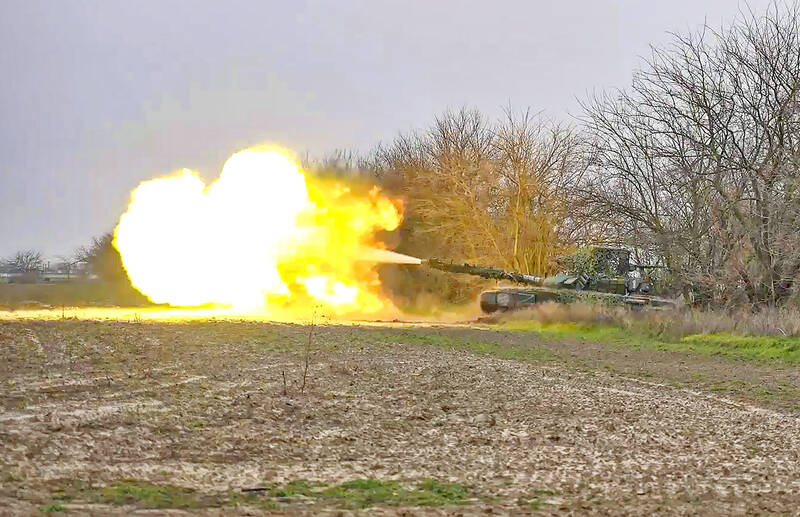About 20 percent of nitrocellulose — a compound used in gunpowder — imported into Russia has been sourced from Taiwan, a joint British-Ukrainian investigative report showed.
Nitrocellulose is a key component of smokeless gunpowder, and the EU has banned export of the compound to Russia due to its ongoing war of aggression against Ukraine.
The report said that nitrocellulose produced in Taiwan makes its way to Russia by passing through other countries such as Turkey. Only one company, T.N.C. Industrial Co (台硝), was named in the report, which also named China and Germany as key sources of the compound for Russia.

Photo: EPA-EFE
Before the war, EU countries such as Italy and the Netherlands were among the top 10 nitrocellulose suppliers to Russia, but have now stopped exporting the compound to Russia.
Between March 1, 2022, and Dec. 31 last year, 80 percent of Taiwan-made nitrocellulose that reached Russia had gone through a Turkish company called Noy Ic Ve Dis Ticaret Ltd Sti.
The report cited customs data from various countries and the UN Commodity Trade Statistics Database showing that Russia imported Taiwan-made nitrocellulose worth nearly US$5.43 million during this period. During the two-year period from 2019 to 2021, only about US$127,000 of Taiwan-made nitrocellulose was obtained by Russia. In 2022, the amount nearly doubled to about US$220,000, and then soared last year.
The report said that despite the increase, Taiwan-sourced nitrocellulose was still significantly less than that sourced from China, which reached US$160 million over the same period. However, prior to 2022 there were few records of China exporting nitrocellulose to Russia.
The investigation was carried out by the UK think tank Royal United Services Institute in cooperation with Ukraine’s Centre for Defense Strategies, and analyzed the channels of supply of raw materials for Russian ammunition production.
The report said that despite advances in defense technology, artillery and multiple-launch rocket systems still played the most important role in combat, with about 70 percent of battle losses on both sides attributed to artillery.
Although Russian officials have set a goal of producing 2 million rounds of artillery shells per year, this quantity would likely not meet the needs of the front line, and rapidly increasing domestic production capacity in the short term would be difficult, the report said. Affected by sanctions and transportation embargoes, Russia has had to step up its production of gunpowder and explosives, which require the import of raw materials, it said.
The report urged those selling raw materials used in ammunition to Russia to instead sell the materials to NATO countries to produce ammunition to aid Ukraine’s defense.

The Grand Hotel Taipei on Saturday confirmed that its information system had been illegally accessed and expressed its deepest apologies for the concern it has caused its customers, adding that the issue is being investigated by the Ministry of Justice Investigation Bureau. The hotel said that on Tuesday last week, it had discovered an external illegal intrusion into its information system. An initial digital forensic investigation confirmed that parts of the system had been accessed, it said, adding that the possibility that some customer data were stolen and leaked could not be ruled out. The actual scope and content of the affected data

‘LIKE-MINDED PARTNER’: Tako van Popta said it would be inappropriate to delay signing the deal with Taiwan because of China, adding he would promote the issue Canadian senators have stressed Taiwan’s importance for international trade and expressed enthusiasm for ensuring the Taiwan-Canada trade cooperation framework agreement is implemented this year. Representative to Canada Harry Tseng (曾厚仁) in an interview with the Central News Agency (CNA) said he was increasingly uneasy about Ottawa’s delays in signing the agreement, especially as Ottawa has warmed toward Beijing. There are “no negotiations left. Not only [is it] initialed, we have three versions of the text ready: English, French and Mandarin,” Tseng said. “That tells you how close we are to the final signature.” Tseng said that he hoped Canadian Prime Minister Mark Carney

President William Lai (賴清德) yesterday bestowed one of Taiwan’s highest honors on Saint Vincent and the Grenadines (SVG) Ambassador Andrea Clare Bowman in recognition of her contributions to bilateral ties. “By conferring the Order of Brilliant Star with Grand Cordon on Ambassador Bowman today, I want to sincerely thank her, on behalf of the Taiwanese people, for her outstanding contribution to deepening diplomatic ties between Taiwan and SVG,” Lai said at a ceremony held at the Presidential Office in Taipei. He noted that Bowman became SVG’s first ambassador to Taiwan in 2019 and

A man walks past elementary school artworks at the Taipei Lantern Festival in Ximen District yesterday, the first day of the event. The festival is to run from 5pm to 10pm through March 15.